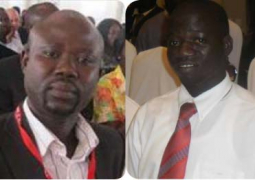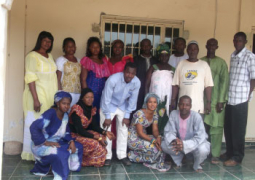Over thirty wildlife rangers and Site Management Committee members from
The programme was held at the headquarters of the Kiang West National Park Dumbuto in Lower River Region.
According to officials, the training programme is run by the project management unit of the Government of The Gambia supported by the World Bank through the Gambia Biodiversity Institutional Strengthen Project (GMBIS) under the Department of Parks and Wildlife Management job training package.
Some of the topics dealt with are team building in Protected Areas Management, conflict resolution techniques, channel of communication, development of wildlife management work plan techniques, management planning development, environmental education and community awareness campaign strategies, and management effective tracking tools, to better equip the actors.
Momodou L. Kassama, Principal Conservation Officer, on behalf of the Director Department of Parks and Wildlife Management, underscored the significance of the training.
Using management effectiveness tracking tools to develop approaches is the right way to evaluate the project objectives and make necessary adjustments if any, Mr Kassama said.
In The Gambia, wildlife management is defined as a broad field that can encompass a variety of duties, such as manipulative, he said, adding that custodial wildlife management should be well defined by the participants as far as environment education is concerned.
The training for wildlife management is therefore to equip the staff with the knowledge and understanding of their various duties and functions as wildlife conservators in a bid to protect and conserve the country’s natural resources.
Ousainou Touray, project coordinator of GMBIS, explained how reports were written and the assigning of two pilot site wardens and their rangers who were able to write report and presented it during the afternoon session, and comments were highlighted by the participants and adopted by presenters.
He further pointed out how to resolve conflict between park staff and also between the park management and the resource users, and the ability to work within a multi-disciplinary workplace and operate effectively as a member of a collaborative team.
“This project will enhance the capacities of the target beneficiaries by equipping them with the skills required of protected area staff through regular upgrading of their skills and knowledge on protected areas management to meet standards.”
Mawdo Jallow, Head of Research & Development Unit under the department, said the ultimate objective of the training was to strengthen park rangers and Site Management Committee members’ capacities, particularly in protected areas management to enable them to meet their environmental and development objectives as well to facilitate the transfer and assimilation of new environmentally sound, socially acceptable and appropriate methods and know-how.
Jallow said they should follow the right communication channel, accordingly to yield positive impact, and minimize the negative impacts in and outside the protected areas.
Mr Jallow says education is critical for promoting sustainable development and improving the capacity of the people to address environment and development issues.
Basic education provides the understanding for any environmental and development education, he said, adding that the latter needs to be incorporated as an essential part of learning.
Fabala Kinteh, acting warden of Baobolon Wetland Reserve, said the training and awareness campaign was very effective and timely, because
“The general public will now be able to take charge of their responsibilities as members of the communities”.
Kawsu Jammeh, PoWPA Project Coordinator, presented the issue of how to develop management planning.
“Each park has unique features that require specific management.
However, objectives common to all include protecting and preserving plants, wildlife, ecosystems, and features of special scientific, archaeological or cultural importance, encouraging appreciation and awareness of natural history.




